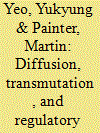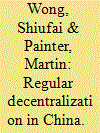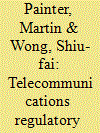|
|
|
Sort Order |
|
|
|
Items / Page
|
|
|
|
|
|
|
| Srl | Item |
| 1 |
ID:
106783


|
|
|
|
|
| Publication |
2011.
|
| Summary/Abstract |
Marketization and state restructuring are proceeding apace in China and Vietnam. China and Vietnam are not, however, converging upon the global regulatory model, even allowing for customary national variations. Rather, they are building up distinctive forms of regulatory regimes aiming to maintain the party-state's control over key state sectors, while at the same time integrating with the global economy and conforming to international norms and standards. This study argues that the regulatory model being adopted in Vietnam and China is the product of a specific kind of transition from a command to a market economy within an authoritarian political regime. While diffusion theories are of use in identifying external driving forces for the reform effort, these theories are of limited value for unveiling the dynamics of local contexts. Indigenous incentives, opportunity structures, and the experimental nature of public policy explain why, despite their exposure to global reform movements and commitment to multilateral institutions, China and Vietnam are likely to end up not with just a variety of the same regulatory regime, but a different one. The case of telecommunications regulation is used to illustrate this.
|
|
|
|
|
|
|
|
|
|
|
|
|
|
|
|
| 2 |
ID:
055163


|
|
|
| 3 |
ID:
085506


|
|
|
|
|
| Summary/Abstract |
How to regulate decentralization without losing Beijing's development power is a focal point in the five papers that follws. The first paper, by Martinez-Vazquez, Quiao and Zhang examines the shift from administrative to unregulated economic decentralization, seeking to explain the uneven distribution to fiscal resources across the whole country.
|
|
|
|
|
|
|
|
|
|
|
|
|
|
|
|
| 4 |
ID:
149305


|
|
|
|
|
| Summary/Abstract |
Making sense of the behavior of local government officials is important for understanding the operation of large multi-tiered governance systems such as China. Local officials have often been seen as self-serving maximizers of the ‘local interest’, adopting the best possible strategies of action allowed by the circumstance of the time. A prevailing view in the literature, influenced by frames of analysis provided by principal–agent theory, is that local officials are shirkers and rent-seekers. In fiscal policy, where resources have normally been tight, this means local hoarding of resources, shirking of spending responsibilities and assertive bidding for central projects, resulting in inefficiencies in resource allocation. Recently a substantial inflow of central funding into local education offers an opportunity to reassess this characterization of local strategic behavior. How have local leaders responded at a time of relative fiscal abundance? Did they seek to increase ever more funding inflow and reduce local responsibility? Examining aggregate statistics at the national level and local case materials from the central part of the Chinese hinterland, this article finds that available evidence does lend some support to previous observations of local fiscal behavior, such as diverting funds. However, other expenditure patterns in the presence of relative abundance of central funds present strong evidence that this behavior masks a deeper motivation to act responsibly in the pursuit of shared education reform goals.
|
|
|
|
|
|
|
|
|
|
|
|
|
|
|
|
| 5 |
ID:
077757


|
|
|
|
|
| Publication |
2007.
|
| Summary/Abstract |
Successful economic liberalization somewhat paradoxically requires high levels of state capacity, while 'deregulated' markets deploy new regulatory mechanisms that, rather than diminishing state power, reconfigure it. A comparative case study into the recent liberalization reforms of the telecommunications sectors of Hong Kong and Singapore is presented here in order to throw light on these developments. The end result of the reform processes in each jurisdiction is quite similar - globally open, competitive and highly efficient telecommunications markets in which major global companies are leading players. However, the routes by which this end result was achieved tell different stories about the manner in which governments balance domestic interests in the process of liberalization. They build on local institutional strengths and deploy instruments appropriate to their own bureaucratic and political contexts. Correspondingly, in constructing the 'new regulatory state', they produce subtle variations on the pro-competitive model of regulation. However, detailed analysis of the two reformed telecommunications regimes shows that underlying these differences is the prominence of a common set of instruments that make less use of highly intrusive, direct forms of state power but greater use of more indirect forms that thrive 'in the shadow' of state authority, a phenomenon that is at the heart of theorizing about the new regulatory state. These instruments enhance rather than diminish state capacity where they are deployed strategically by governments
|
|
|
|
|
|
|
|
|
|
|
|
|
|
|
|
|
|
|
|
|